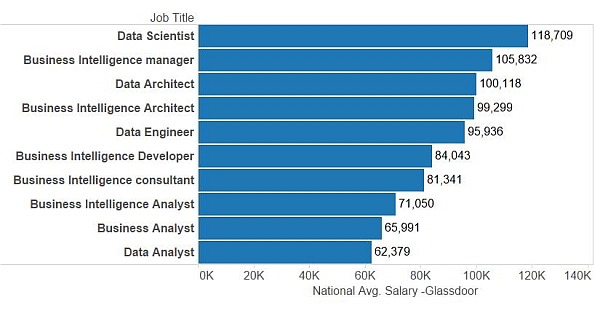The field of Business Intelligence (BI) has experienced significant growth in recent years, driven by the increasing demand for data-driven decision-making in organizations. As a result, BI professionals have become highly sought after, and their salaries have risen accordingly. In this article, we will provide an in-depth analysis of BI salary trends, including the factors that influence salaries, the average salary ranges for different BI roles, and the future outlook for the industry.

Introduction to Business Intelligence
Business Intelligence refers to the process of collecting, analyzing, and interpreting data to inform business decisions. BI professionals use a range of tools and techniques, including data visualization, reporting, and predictive analytics, to help organizations optimize their operations, improve customer engagement, and increase revenue. The BI industry encompasses a broad range of roles, including data analysts, business analysts, data scientists, and IT professionals.
Factors Influencing BI Salaries
Several factors influence BI salaries, including:
- Location: Salaries for BI professionals vary significantly depending on the location. Cities with a high cost of living, such as New York or San Francisco, tend to offer higher salaries to compensate for the increased expense of living.
- Industry: BI salaries also vary depending on the industry. For example, professionals working in the finance or healthcare sectors tend to earn higher salaries than those in the non-profit or education sectors.
- Experience: As with most professions, experience plays a significant role in determining BI salaries. Professionals with more years of experience tend to earn higher salaries, as they have developed a deeper understanding of the industry and have honed their skills.
- Skills: The specific skills and tools that a BI professional has expertise in can also impact their salary. For example, professionals with expertise in cloud-based BI tools, such as Amazon QuickSight or Google Data Studio, may earn higher salaries than those with expertise in traditional on-premise tools.
- Education: The level of education that a BI professional has attained can also influence their salary. Professionals with advanced degrees, such as a Master’s or Ph.D., tend to earn higher salaries than those with bachelor’s degrees.
Average Salary Ranges for BI Roles
The average salary ranges for BI roles vary depending on the specific job title, location, and industry. Here are some approximate average salary ranges for common BI roles:
- Data Analyst: $60,000 – $90,000 per year
- Business Analyst: $80,000 – $120,000 per year
- Data Scientist: $100,000 – $140,000 per year
- BI Developer: $90,000 – $130,000 per year
- BI Manager: $120,000 – $160,000 per year
Future Outlook for the BI Industry
The future outlook for the BI industry is highly promising, with the global BI market expected to grow from $23.1 billion in 2020 to $43.3 billion by 2025, at a Compound Annual Growth Rate (CAGR) of 10.3% during the forecast period. This growth is driven by the increasing demand for data-driven decision-making, the rise of cloud-based BI tools, and the growing need for advanced analytics and machine learning capabilities.
Emerging Trends in BI
Several emerging trends are expected to shape the BI industry in the coming years, including:
- Cloud-based BI: The adoption of cloud-based BI tools is expected to continue to grow, driven by the need for greater flexibility, scalability, and cost savings.
- Artificial Intelligence (AI) and Machine Learning (ML): The use of AI and ML in BI is expected to become more widespread, as organizations seek to automate decision-making and improve predictive analytics capabilities.
- Data Visualization: The importance of data visualization is expected to continue to grow, as organizations seek to communicate complex data insights to non-technical stakeholders.
- Self-Service BI: The adoption of self-service BI tools is expected to continue to grow, driven by the need for business users to access data insights without relying on IT.
FAQ
- What is the average salary for a BI professional?
The average salary for a BI professional varies depending on the specific job title, location, and industry. However, the average salary range for BI professionals is approximately $80,000 – $120,000 per year. - What skills are most in demand for BI professionals?
The most in-demand skills for BI professionals include expertise in cloud-based BI tools, data visualization, predictive analytics, and machine learning. - What is the future outlook for the BI industry?
The future outlook for the BI industry is highly promising, with the global BI market expected to grow from $23.1 billion in 2020 to $43.3 billion by 2025. - How can I get started in a BI career?
To get started in a BI career, it’s essential to develop a strong foundation in data analysis, statistics, and computer programming. Consider pursuing a degree in a relevant field, such as computer science, mathematics, or business, and gain practical experience through internships or entry-level positions.
Conclusion
In conclusion, the BI industry is a rapidly growing field, driven by the increasing demand for data-driven decision-making in organizations. BI professionals play a critical role in helping organizations optimize their operations, improve customer engagement, and increase revenue. The average salary ranges for BI roles vary depending on the specific job title, location, and industry, but overall, BI professionals can expect to earn competitive salaries and benefits. As the industry continues to evolve, emerging trends such as cloud-based BI, AI, and ML, data visualization, and self-service BI are expected to shape the future of the industry. Whether you’re just starting out in your career or are an experienced BI professional, the future outlook for the BI industry is highly promising, and there are many opportunities for growth and advancement.
Closure
Thus, we hope this article has provided valuable insights into Business Intelligence Salary Trends: A Comprehensive Overview. We hope you find this article informative and beneficial. See you in our next article!


